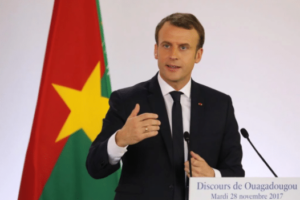
Emmanuel Macron, 40, hopes to reverse the decline in use of the French language in institutions across the world. (Photo by Ludovic Marin/AFP/Getty Images)
French President Emmanuel Macron is launching efforts to expand global use of his native language, particularly on the continent of Africa.
On Tuesday, which marked International Francophonie Day, Macron laid out his plans to improve the standing of the French language on an international scale, according to the Daily Mail. French is currently the world’s fifth-most spoken language in the world after Mandarin Chinese, English, Spanish and Arabic.
“France today should be proud of being one country among others that learns, speaks and writes in French,” Macron told the Académie Française, the council for matters pertaining to the French language that has struggled for years to prevent the tide of English expressions from flooding into French. ” … French should become the language that creates tomorrow’s world.”
Macron, a fluent English-speaker who’s faced criticism for his use of English expressions, has his sights set on the young population in Africa, which he hopes will help make French a “world language.”
During a visit to Burkina Faso in November, the 40-year-old president entreated Africans to help French become “the first language in Africa and maybe even the world in the coming decades!” Daily Mail reported. He added that he was from a “generation that doesn’t come to tell Africans what to do” and suggested the French tongue is no longer solely French, “but also, maybe even more so, African.”
The International Francophonie Organization projects that more than 1 billion people will live in French-speaking countries by 2065 because of the explosive population growth in Africa. It also predicted French will overtake English in Africa by 2050, citing much faster population growth in nations colonized by the French.
Macron’s plans to assert the French language have been met with skepticism, however, especially among Africans who worry his efforts are just another way for the French to meddle in the business of its former colonies.
“If he really wanted to get away from the colonial past, he would have consulted more, listened more and engaged in more dialogue” with Africans, Franco-Djiboutian author Abdourahman Waberi told AFP.


